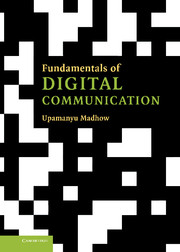Book contents
- Frontmatter
- Contents
- Preface
- Acknowledgements
- 1 Introduction
- 2 Modulation
- 3 Demodulation
- 4 Synchronization and noncoherent communication
- 5 Channel equalization
- 6 Information-theoretic limits and their computation
- 7 Channel coding
- 8 Wireless communication
- Appendix A Probability, random variables, and random processes
- Appendix B The Chernoff bound
- Appendix C Jensen's inequality
- References
- Index
5 - Channel equalization
Published online by Cambridge University Press: 05 June 2012
- Frontmatter
- Contents
- Preface
- Acknowledgements
- 1 Introduction
- 2 Modulation
- 3 Demodulation
- 4 Synchronization and noncoherent communication
- 5 Channel equalization
- 6 Information-theoretic limits and their computation
- 7 Channel coding
- 8 Wireless communication
- Appendix A Probability, random variables, and random processes
- Appendix B The Chernoff bound
- Appendix C Jensen's inequality
- References
- Index
Summary
In this chapter, we develop channel equalization techniques for handling the intersymbol interference (ISI) incurred by a linearly modulated signal that goes through a dispersive channel. The principles behind these techniques also apply to dealing with interference from other users, which, depending on the application, may be referred to as co-channel interference, multiple-access interference, multiuser interference, or crosstalk. Indeed, we revisit some of these techniques in Chapter 8 when we briefly discuss multiuser detection. More generally, there is great commonality between receiver techniques for efficiently accounting for memory, whether it is introduced by nature, as considered in this chapter, or by design, as in the channel coding schemes considered in Chapter 7. Thus, the optimum receiver for ISI channels (in which the received signal is a convolution of the transmitted signal with the channel impulse response) uses the same Viterbi algorithm as the optimum receiver for convolutional codes (in which the encoded data are a convolution of the information stream with the code “impulse response”) in Chapter 7.
The techniques developed in this chapter apply to single-carrier systems in which data are sent using linear modulation. An alternative technique for handling dispersive channels, discussed in Chapter 8, is the use of multicarrier modulation, or orthogonal frequency division multiplexing (OFDM). Roughly speaking, OFDM, or multicarrier modulation, transforms a system with memory into a memoryless system in the frequency domain, by decomposing the channel into parallel narrowband subchannels, each of which sees a scalar channel gain.
Information
- Type
- Chapter
- Information
- Fundamentals of Digital Communication , pp. 199 - 251Publisher: Cambridge University PressPrint publication year: 2008
